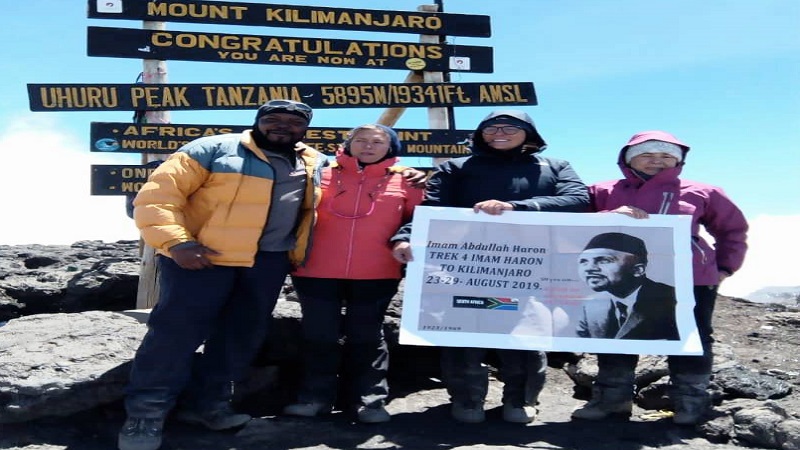No one would ever have thought the iconic face of Imam Abdullah Haron would ever be seen on the highest peak in Africa. But it was one women’s mission to shine the spotlight his legacy, on top of Mount Kilimanjaro. UCT Post-Doctoral Fellow and wife to the nephew of the late imam Haron, Dr Tasneem Johaardien, hoisted a banner with the famous martyr’s face last week, saying she had finally achieved a life-long goal that had taken on a new meaning.
After returning from the profound trek this weekend, she spoke to VOC’s Breakfast Beat about her experience.
“This had been a dream of mine from a young age. I was born in Spain, but I had dreamt of Africa from very, very young and when I moved to South Africa 20 years ago it was something that was (still) with me. When the opportunity arose, and we realized we were in the period of Imam Abdullah Haron’s detention, it became even more significant that I could undertake the trip in honour of his memory.”
At the beginning of June, the Imam Haron 50th year Commemoration Committee kicked off its 123-day campaign to honour his decade’s long fight against the Apartheid regime. The 123 days consists of a series of educational, religious, cultural, sporting and political events, symbolic of the number of days the martyr spent in detention before his murder. Johaardien gave a heartfelt account of how the Imam’s legacy inspired her.
“Ever since I arrived, Imam Abdullah Haroun has been a big part of what I’ve come to understand as (his) contribution to South Africa and Islam and his huge role in the fight against apartheid. (As well as) his fight for equal rights for everybody in the country to be part of the ummah and his real struggle where people at the time were quiet.”
“So, he’s been inspiration to me, and my family and it was really an honour to be able to contribute just with that little grain of sand of this journey.”
While Mount Everest stands a proud 2,950 metres above sea level, the African mountain of Kilimanjaro is the highest free-standing mountain in the world at an incredible 5,895 metres above sea level. It is however not only known for its height, but also its magnificent views.
“The peak itself is splendorous, Kilimanjaro is an incredible mountain and it really represents, for me, the power and majesty of Allahu ta’ala – and the beauty!” expressed Johaardien.
The UCT fellow was among four others who reached the peak. She explained how the memory of the late Imam acted as great motivation.
“Thinking of Imam’s legacy and this great hero who gave up his life for all of us and our freedoms today… For my family, my children and my extended family- that really kept me thinking and going. Through all the small, difficult moments where you think you ‘can’t anymore’, you think if he could sacrifice his life, then I can do this. It really helped very much.”
There are seven official routes on Mount Kilimanjaro. Six are used for ascent, namely: Machame, Umbwe, Marangu, Shira, Lemosho, Rongai; while only the Mweka trail is used for decent. Johardien told of the perseverance required to conquer the journey, adding that their courage was strengthened knowing that they had a greater purpose.
“We took the Mashame route, which is seven days, and, of cause, Kilimanjaro is the highest peak in Africa- almost 6000 m above sea level. It requires a lot of resilience, not just physical but also mental. Its very important to have mental endurance and be able to motivate yourself to keep going.”
“If you had an added motivation, such as the spiritual motivation (we had), something that can lead and push you on like Imam Abdullah Haron’s legacy, that becomes a big part of the journey.”
While many have different versions and accounts of the late Imam’s legacy, many considered him to be a progressive scholar that fought resiliently for human rights. He had also been passionate about children and women, who were often seen as inferior during Apartheid. Johaardien expressed how empowered she had felt as a woman.
“The family and the foundation were very proud and felt it was an appropriate way of honouring Imam Abdullah Haron because he was a great defender of woman’s rights. He always supported women in their endeavors, women fulling their dreams, studying further, doing anything that could challenge themselves to do.”
“So, having a group of women summiting was very important and also that it was in South Africa. Imam Haron was a big believer in getting all sorts of people, of all colours, together (to start) breaking barriers. Summiting the highest peak in Africa became very symbolic in this regard.”
The doctor emphasized that, given that the wide range of socio-economic ills plaguing the country, introspection is crucial.
“It’s very important for all of us to remember our great struggle heroes of the past and understand that the struggle continuous. Imam Abdullah Haron’s family doesn’t have justice for his death and there have been no perpetrators brought to justice. We have to remember and keep struggling in the present because there are so many things that need changing and we all should contribute in the small way that we can.”
VOC






 WhatsApp us
WhatsApp us 

